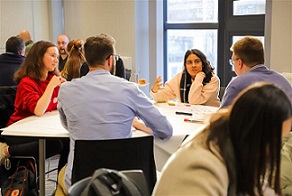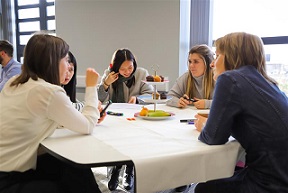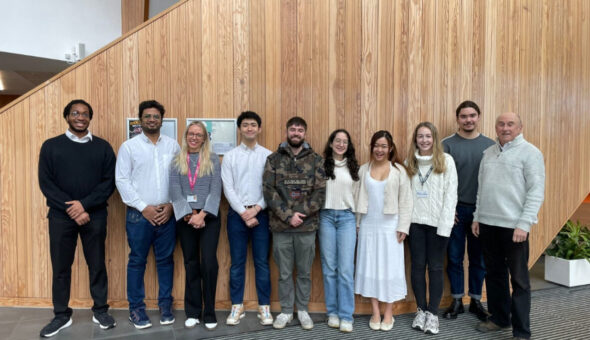A couple of weeks ago, I went along to the first Humanities & Social Sciences Future Faculty: Change Makers event. When I arrived, the first thing I noticed was the energy and enthusiasm in the room, as students and staff gathered in groups around key themes. It was a great chance to meet in an informal setting. The group discussion areas had tablecloths and coloured pens for recording ideas, and plenty of tea and cake. We moved between tables to discuss key themes, with student volunteers to facilitate. It was a chance to hear and share perspectives with students and with staff in different roles.
I work as a Learning Technologist in the Technology Enhanced Learning (TEL) team (Centre for Learning & Teaching), a staff-facing role that supports the use of learning technologies. I am the primary contact for Faculty of Humanities and Social Sciences. I rarely get the chance to hear directly from students in my day-to-day work, so this event was a great opportunity to hear from students across disciplines and at different stages of their studies. The key themes of Learning and Teaching, Assessment and Feedback, Skills and Employability are core strands in our work. So what came out of the day for me?
Assessment and feedback
There were some really useful insights into student experiences of assessment and feedback.
- It is not always easy for students to access their feedback, review it and take it forward from one assessment to the next. Some students, for instance, were not aware how to access Moodle Archives. They wanted to review study materials, assessment and feedback from previous years but did not know where to find it. Staff don’t always know to signpost this either. So a simple action and top priority to come out of the day for me, was to look at how we share this information with all staff and students. In the longer term, a possible project idea came up.
- Could we develop an online space where students can access and engage with all their assessment and feedback in one place? This could be a ‘student dashboard’ or ‘feedback portfolio', such as the Feedback Engagement and Tracking at Surrey*, for example.
- Another topic was variety of assessment types. One student shared their approach to working on essay writing in creative and visual ways, using mood boards. Different modes of assessment, such as creating video, could give students more scope for creativity. This can help develop digital skills to showcase to employers. There is also an opportunity to help students develop group work and collaboration skills through assessment. For some students this would fit well with their preferred ways of working, while others will need support to develop those skills as part of their learning. Staff will also need time and professional development opportunities to develop digital capabilities.
Skills and employability
 There were some interesting conversations around employability skills. One student shared their experience of the work environment during internships in the banking sector. In the work environment, they worked in open-plan offices, with spaces for team working, presenting and sharing. This was a contrast with their experience at university, and they didn't feel prepared.
There were some interesting conversations around employability skills. One student shared their experience of the work environment during internships in the banking sector. In the work environment, they worked in open-plan offices, with spaces for team working, presenting and sharing. This was a contrast with their experience at university, and they didn't feel prepared.
This got me thinking about learning spaces on campus – do we have enough spaces where students can work together and share and present their work? Do our learning and teaching environments help prepare students for collaborative work environments?
Examples elsewhere include the Digitally Enhanced Learning spaces at University of Aberdeen or the TechnoCafe at Durham. Here on campus, for more flexibility in our existing GTA teaching spaces we now have Vivi display sharing. This allows students to share and present from anywhere in the room. It gives an option to introduce interactivity and digital sharing in to existing spaces.
From a staff perspective, our office environments very often don’t support collaborative working. We also need to support staff to develop the capabilities and confidence in technology enabled spaces. One way to do this can be with staff development opportunities such as the digital development initiative at Teesside University
Learning and Teaching
 Another insight from the day was to hear from a student how inspiring they find it when staff encourage them to make links across subjects and disciplines. Others wanted more chances to meet and socialise with students beyond their own courses. This made me think of the Grand Innovation Challenge. Listening to students at the Faculty Future: Change Makers event, it was obvious that they value the chance to share perspectives and develop skills across disciplines.
Another insight from the day was to hear from a student how inspiring they find it when staff encourage them to make links across subjects and disciplines. Others wanted more chances to meet and socialise with students beyond their own courses. This made me think of the Grand Innovation Challenge. Listening to students at the Faculty Future: Change Makers event, it was obvious that they value the chance to share perspectives and develop skills across disciplines.
I hope that there will be more events like this where students and staff can come together and share ideas. As a member of professional services staff, this has been a brilliant opportunity to hear directly about student’s experiences. There is lots of food for thought to help us reflect on how our work supporting staff development can contribute to the student experience.
Rachel Applegate, Learning Technologist
TEL team, Centre for Learning & Teaching
* Dr Naomi Winstone will be presenting at our next Talk Teaching event: From Transmission to Transformation: Maximising student engagement with feedback - Friday 10 January. More details and booking here.
Photo credit: Ashish Nagpal (MEng (Hons) Mechanical with Automotive Engineering)
Respond



